イベントスケジュール - COP25 JAPAN PAVILION
2019.12.07
Southeast Asia Regional Focused Dialogue
- Designing National MRV Framework for Tracking Progress of NDCs and City-level Climate Action -
Organizer
- Japan International Cooperation Agency (JICA)
- Overseas Environmental Cooperation Center (OECC)
- Thailand Greenhouse Gas Organizations (TGO)
- Vietnam Ministry of Natural Resources and Environment (MONRE)
- Bangkok Metropolitan Administration (BMA)
- Ho Chi Minh City Department of Natural Resources and Environment (DONRE)
Event Overview
Agenda of the Event
-
10:30 –10:35 Opening Remark
Mr. Hiromichi Murakami, Senior Deputy Director General, Global Environment Department, JICA
Session I : National-level Systems Development to Track Progress of NDC implementation in SEA
-
10:35 – 11:25 Panel Discussion
Moderator: Mr. Koji Fukuda, Chief Advisor, JICA Technical Assistance/Thailand
Panelists : Thailand, Vietnam, United Nations Economic and Social Commissions for Asia and the Pacific (UNESCAP), Asian Development Bank (ADB), Overseas Environmental Cooperation Center (OECC)
-
Setting the Scene
(Mr. Koji Fukuda, Chief Advisor, JICA Technical Assistance/Thailand)
-
Thailand's Sharing Experiences from ASEAN Countries: Developing Country Approaches on NDC Target Tracking and Capacity Building Needs
(Mr. Thawatchai Saengkhamsuk Director, International Climate Change Technical Training Center (CITC), TGO)
-
Vietnam’s experience on national-level system to track the progress of implementing and achieving NDC
(Dr. Luong Quang Huy, Director, Department of Climate Change, Vietnam MONRE)
-
Reflections of tracking the progress of implementing and achieving NDC
(Dr. Stefanos Fotiou, Director, Environment and Development Division, UNESCAP)
-
Lessons learned from GMS MRV Workshop on Robust MRV Frameworks for Implementation of NDCs in the Greater Mekong Sub-region
(Dr. Ancha Srinivasan, Principal Climate Specialist, ADB)
-
Key Findings from Private-Sector Tracking Initiative (PASTI) and Recommendations
(Mr. Riki Nakajima, Researcher, Overseas Environmental Cooperation Center (OECC))
-
Open Discussion
-
11:25 – 11:30 Closing of Session 1 (Mr. Thawatchai Saengkhamsuk, Director, CITC/TGO)
Session II: Capacity-building experiences with transparency at the local government level
-
11:30-12:25 Presentations and discussions
Moderator: Dr. Luong Quan Huy, MONRE, Vietnam and Ms. Yui Matsuo, JICA SPI-NAMA
-
Introduction to efforts to increase transparency at city-level
(Dr. Jun Ichihara, Chief Adviser, JICA SPI-NAMA/Vietnam)
-
Increasing the readiness for future Ho Chi Minh City Climate Change Action Plan (HCMC CCAP) - strengthening energy efficiency by a designing a carbon reporting system
(Dr. Mai Tuan Anh, Director, HCMC/DONRE)
-
The Comprehensive Review of the Bangkok Master Plan on Climate Change 2013-2023 and rising momentum for post-2020 actions
(Ms. Termsiri Chongpoonpol, Director, BMA)
-
Climate measures by the City of Yokohama
(Mr. Kimihiro Kuromizu, Climate Change Policy Headquaters, City of Yokohama)
-
ADB's experiences with working with cities in Asia
(Dr. Ancha Srinivasan, Principal Climate Specialist, ADB)
-
-
11:25-11:30 Questions and Answers Closing
Speaker
- Mr. Hiromichi Murakami, Japan International Cooperation Agency (JICA), Senior Deputy Director General, Global Environment Department
- Mr. Koji Fukuda, Japan International Cooperation Agency (JICA), Chief Advisor, TA (Thailand)
- Mr. Thawatchai Saengkhamsuk, Thailand Greenhouse Gas Management Organization (TGO), Director, International Climate Change Technical Training Center (CITC)
- Dr. Luong Quang Huy, Ministry of Natural Resources and Environment of Vietnam, Director, Department of Climate Change
- Dr. Stefanos Fotiou, United Nations Economic and Social Commissions for Asia and the Pacific (UNESCAP), Director, Environment and Development Division
- Dr. Ancha Srinivasan, Asian Development Bank (ADB), Principal Climate Specialist
- Mr. Riki Nakajima, Overseas Environmental Cooperation Center, Japan (OECC), Researcher
- Dr. Jun Ichihara, Japan International Cooperation Agency (JICA), Chief Advisor, TA (Vietnam)
- Dr. Mai Tuan Anh, Ho Chi Minh City, Director, Department of Natural Resources and Environment
- Ms. Termsiri Chongpoonpol, Bangkok Metropolitan Administration, Director, Department of Environment
- Mr. Kimihiro Kuromizu, City of Yokohama, Climate Change Policy Headquarters
Event Materials
Event Summary
The First Session focused on the current state of affairs, progresses made, practical issues and remaining capacity needs associated with tracking the progress of implementing and achieving NDCs, in conformity with the Article 13 of the Paris Agreement and the Katowice Rulebook (MPGs). Country presentations identified the need for further interpretation of transparency in national context to add clarity, and legal foundation, institutional arrangement and technical guidance as essential elements for ensuring effectiveness of NDC implementation. Designing indicators to track mitigation measures not quantified by GHG emission reduction amount, and sectoral data collection were observed to be remaining issues, and systematizing arrangement is required for sophisticating the process. Flexibility was also emphasized to fill in the gap between the speed of decisions coming out of UNFCCC negotiation as opposed to the nature and speed of amendment for domestic legal system to accommodate such new requirements.
Development partner participants pointed out the importance of engagement of non-state actors, differentiating tracking of financial flows according to the layer of targets set by ASEAN countries (targets by domestic/unilateral effort and by international support), as well as harmonizing and sharing of methodologies across countries. The need to tailor tracking of implementation and achievement of NDC was also raised, taken into account the diversity of emission profile across ASEAN countries. The common issues were also identified as holistic approach to address thematic transparency requirement (mitigation, adaptation, means of implementation), legal systems for NDC and transparency, human resource development and capacity retention. PASTI also introduced the activity focused on private sector, with an intention to harmonize methodology to capture and track the mitigation impacts.
Subsequent overall discussion captured the necessity of coordination and harmonization of NDC tracking with parallel effort to capture SDGs through Voluntary National Review (VNR), clarifying the scope/target of tracking (action vs outcome, financial flow), and participants acknowledged the importance of further effort to narrow down the gap of stakeholder perception and level of understandings of transparency. With respect to NDC-SDGs nexus, further domestic coordination effort by agencies in charge (foreign affairs and climate change focal point) was also referred to by the session moderator.
In the Second session, experts presented cases of transparency practices in local governments in Southeast Asia, in particular, mega-cities like Ho Chi Minh City in Vietnam and Bangkok Metropolitan Administration in Thailand. There are ongoing efforts to build capacities of these cities in ensuring and increasing transparency of mitigation actions.
Ho Chi Minh City is preparing for updating the current Climate Change Action Plan (HCMC CCAP) to be implemented during 2021-2030, under which the city aims to scale up mitigation actions. As part of options, HCMC is now designing a carbon reporting system, which requires GHG emitters to provide report on their emissions, buidling upon the existing energy reporting system.
Bangkok Metropolitan Administration introduced its recent experiences with conducting the Comprehensive Review of the Progress of Implementation of the Bangkok Master Plan on Climate Change 2013-2023. As the mid-term review of the progress of the 10 year Master Plan implementation, actual GHG emissions were aggregated, and the BMA assessed the progress of achievement of its mitigation target in 2020. The presenter mentioned, according to the review, contribution by the transport and energy sectors was substantial.
The City of Yokohama introduced its ongoing and upgraded efforts based on its Yokohama City Action Plan for Global Warming Countermeasures, with its targets of -22% in 2020, -30% in 2030 and carbon neutrality in 2050 (all in comparison with 2013 emissions level). Also, the city stressed the important approach with smart city develoment and promotion of sustainable development goals (SDGs).
Asian Development Bank (ADB) reported its efforts to support low carbon infrastructure development in Asian cities. ADB emphasized its focus on promotion of transformation of cities to a low carbon society.
As part of discussion, participants pointed out the importance of actions made by local governments, which have relatively closer relationship with citizens and private companies. They also recognized the significance of promoting transparency on climate mitigation actions, while such efforts are still at its embryonic stage. Other participants commented that experiences gained and lessons learned through JICA and ADB support, should be shared for further upgrading actions in other cities.
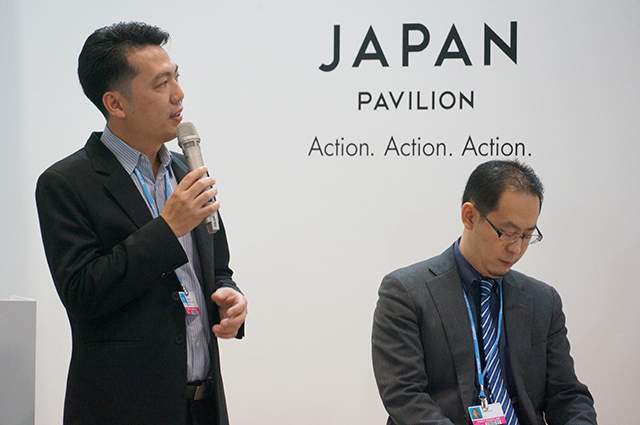
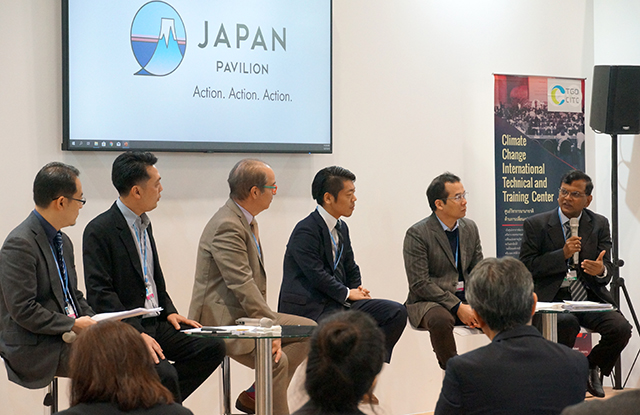
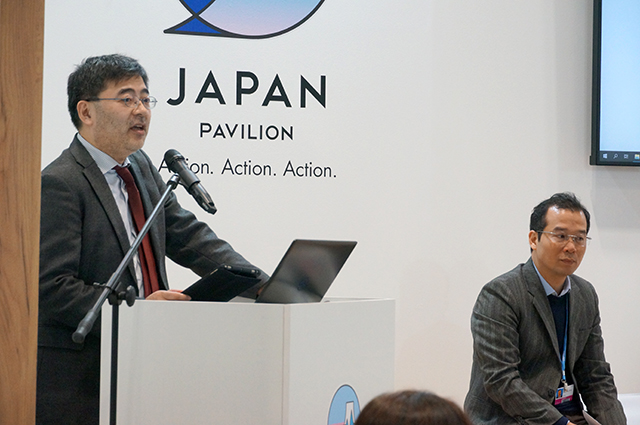
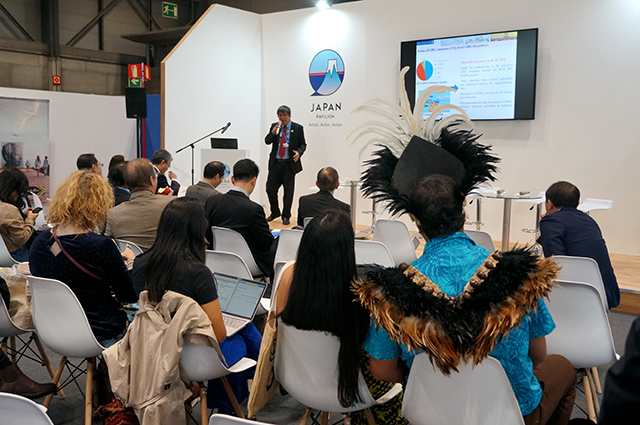
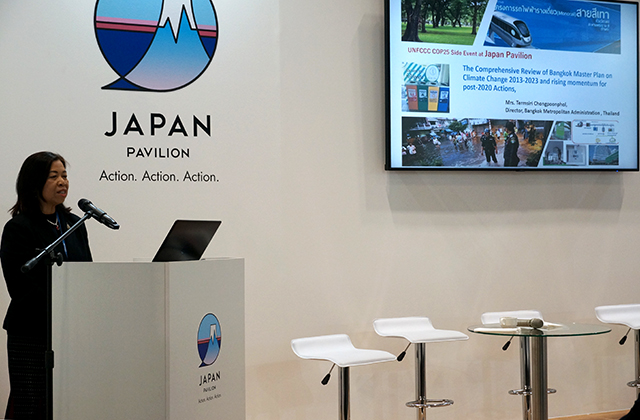
Other Events On This Day
Southeast Asia Regional Focused Dialogue
- Designing National MRV Framework for Tracking Progress of NDCs and City-level Climate Action -
Japan International Cooperation Agency
Oceans Action Day
Sasakawa Peace Foundation